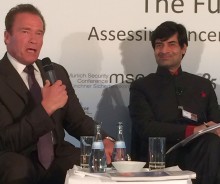On 08 February 2015, the Observer Research Foundation (ORF) and The Economic Policy Forum (EPF) co-hosted the concluding lunchtime panel at the Munich Security Conference (MSC). ORF and EPF also used the occasion to launch their report on “The Future of Energy,” with contributions from various EPF member institutions in India, Brazil, Germany, Russia, China and South Africa. The two-hour session was attended by over eighty high level guests of the MSC, including Chairman Wolfgang Ischinger and the Foreign Minister of Ethiopia, Tedros Adhanom Ghebreyesus.

Photo: EPF
The Future of Energy report was launched by Arnold Schwarzenegger (Founding Chair of Regions20 and former Governor of California), Samir Saran, (Vice President, ORF) and Astrid Skala-Kuhmann (representing the EPF). At the outset, Arnold Schwarzenegger, as keynote speaker and panelist, stressed the importance of clean energy solutions for responding to climate change concerns. He highlighted his successful experiences from Governorship of the state of California to explain how private sector, civil society and governments can work together at the sub national and local levels in order to solve energy policy challenges.
Panelists Sunjoy Joshi (Director, ORF) and Peter Sutherland (former Chairman of BP plc) supplemented Mr. Schwarzenegger’s address by recognizing the rapid technological advances made in clean energy and their increased viability. However, they cited some of the report findings as sobering reminders that conventional fuels including coal, oil and gas will remain the dominant energy sources for the next two decades. Peter Sutherland noted the emergent role of natural gas, stating that a substitution of one per cent of coal generation by gas would need to be matched by an equivalent of an eleven per cent increase in renewable energy based generation. Sunjoy Joshi cautioned that not enough attention is being paid in global energy discourse to the potential of efficiency technologies such as those already available in the coal and thermal sector. He thus made a compelling case for increased technological flows between countries to facilitate a global low carbon transition.

Photo: ORF
Vyacheslav Nikonov (Member of Russian Duma), and Ali Asghar Soltanieh (former Iranian Ambassador to the International Atomic Energy Agency), reaffirmed the findings of the report by recognizing the need for economic diversification in energy exporting economies, to reduce structural vulnerabilities caused by price and demand fluctuations. Mr. Nikonov alluded to the growing importance of China as a destination for Russian energy exports in the face of fledgling growth in its traditional export markets. Meanwhile Ambassador Soltanieh pointed out that the global energy discourse should be de-politicized so that global energy flows are freed from geopolitical uncertainties.
In the open floor discussions, the panelists also commented on African energy sector realities, including possibilities of leveraging natural endowments such as large tracts of land towards renewable energy generation, particularly solar. Their caveat was that many African countries would need to solve structural problems such as the lack of skilled manpower and bridge governance deficits in order to attract larger energy investments. The panelists agreed that in general, a concert of policies, market dynamics and technological trends will drive the future of energy. Collaboration between the economic, scientific and policy communities remains key to ensuring that countries can harness best practices and learn from each other’s’ successes and failures in the energy sector. The panel and open floor discussions were moderated by Samir Saran of the Observer Research Foundation.
Event Programme Information:
MSC Side Event ‘The Future of Energy’ – Programm Information
ORF-EPF Report:
ORF-EPF Report – The Future of Energy
Panel Discussion on YouTube:
https://www.youtube.com/watch?v=nuTDa7fmE7g





